General
July 2010 events
Published
15 years agoon
July 2010
30th July 2010: Google launch of the Google Interface into local languages
Translator Google interface was translated into Runyakitara and Luo languages by CIT as part of its public-private sector contribution. Runyakitara is a family of the Bantu language that standardizes four linguistically closely related languages of western Uganda which are Rutooro, Rukiiga, Runyankole and Runyoro.
29th – 30th July 2010: VC and Management visit to Kibale Field Station
The Makerere University Biological Field Station (MUBFS) is located in the tranquil Kibale Forest at the peripherals of Kibale National Park (KNP). Established in 1970 as Kibale Forest Project-KFP by Dr. Thomas Struhsaker, a renown primatologist and scholar from Duke University, USA, the project was handed over to Makerere University for its long-time survival by Dr. Struhsaker, shortly before his departure in 1987.
The high-quality research being conducted at this world renown field station is being conducted by local and international scholars and includes:
- Ecological & Behavioral Studies of Various Animal Species in KNP.
- Studies of Forest Regeneration in Logged & Formerly Encroached Areas.
- Long-term Ecological Monitoring of Kibale National Park Eco-Systems.
- Socio-Economic & Ecological Studies Including Crop Raiding By Park Wildlife.
27th July 2010: Signing MOU between the Nelson Mandela Metropolitan University South Africa (NMMU) and Mak
The MOU is aimed at making it possible exchange 2 students on continuing basis for each academic year.
27th July 2010: Launch of the Africa Institute for Strategic Animal Resource Services and Development (AFRISA)
AFRISA is a Public-Private Academic Partnership Platform, where the two parties have come together through special agreements, to establish problem solving programs. The primary objective of AFRISA is to reposition and align animal sector education, research and services in the diverse Animal Resources Value chains to meet national, regional and International demands. This will be done alongside promoting holistic and superior Skills, Technology, and Innovation for Production, Employment, Health and Development.
27th July 2010: Public lecture by Dr. Thoraya Ahmed Obaid (UN Under-Secretary General)
The public lecture was on “Reproductive Health and Rights- Perspectives for further Development in Africa” Dr. Thoraya is also the Executive Director of UNFPA.
26th July 2010: ACBF Grant Signing Ceremony
The African Capacity Building Foundation (ACBF) signed a grant with the Economic Policy Research Centre (EPRC) aimed at supporting regional initiatives in the areas of specialized training, policy analysis, applied policy research, negotiation and policy advocacy.
15th July 2010: Handover of book donation from the Swedish Embassy
The Swedish Embassy handed over boxes of books to the Dept. of History, Faculty of Arts. These books were given to the department in 2009.
13th July, 2010: Signing MOU between Mak, University of Southern Carlifornia and IBM East Africa Limited (IBM)
This MOU is meant to establish a collaborative institute (Joint Institute for Mobile Innovations JIMI)
12th July 2010: Signing MOU between Makerere and Orange (U) Ltd.
This collaboration is in areas limited of but not limited to; ICT Application Development, Research and Development, Joint Community Outreach Projects and Knowledge Exchange. It will run for 3years.
9th July 2010: A farewell party for Top Management whose contracts ended this year
This took place at the Makerere Guest House gardens. Some of the top management members included the former Vice Chancellor Prof. Livingstone Luboobi.
8th July 2010: Meeting with Wellcome Trust UK
A delegation from Wellcome Trust, UK led by the Head, Sir. Mark Wallport paid a courtesy call on the VC. Discussions touched on offering Post-Doctoral training in form of academic fellowships to Makerere University staff so as to enhance their research skills, and strengthen health workers’ capacity in Africa, as well as partnering on virus research.
8th July 2010: Meeting with University of Sydney.
The Vice Chancellor met with a team from the University of Sydney and held talks on a partnership aimed at providing scholarships for postgraduate degree programmes in areas of Public Health, Medicine as well as other disciplines in the Australian University.
6th July 2010: Tripartite letter of Agreement for RUFORUM, Fac. of Agric and The National Crops Resources Research Institute
This is aimed at supporting research and training of one student (Dr. Okori). The amount involved is USD 10,000, a laptop and computer.
5th July 2010: 7th Vice Chancellors Media briefing
The 7th monthly media briefing featured the Institute of Statistics and Applied Economics and the Faculty of Technology. The Vice Chancellor made presentations on the successful restructuring and revision of academic programmes by all units by the 30th June 2010 deadline, Capital Investments: Public Private Partnerships (PPP) to develop Makerere land through the Build Operate Transfer (BOT) arrangement, and the issuance of transcripts from August to October 2010 for students meant to graduate in January 2011. He also made presentations on the repair of the road network within the University and halls of residence, redesign/beautification of the Main Gate by the Faculty of Technology & MTSIFA, minor repairs on halls of residence by the Estates and Works Department except for Lumumba hall, which was earmarked for the Renovate Operate Transfer (ROT) arrangement with the private sector, and the setting up of a Technical Committee to handle the issue of academic programmes’ revision at MUBS.
2nd July 2010: Signing MOU between Bergen University College Norway and Mak
The purpose of this MOU is academic and research collaboration. This was under the Dept. of Nursing, Medical School. It will run for 5years
2nd July 2010: Signing MOU between Hawassa University Ethiopia and Mak
The purpose of this MOU is to promote cooperation in teaching and research between the two universities. It will run for 5years
1st – 2nd July 2010: Qualilty Assuarance MURM workshop
Makerere University Management held this all day workshop at L. Victoria Hotel, Entebbe
July 2010
30th July 2010: Google launch of the Google Interface into local languages
Translator Google interface was translated into Runyakitara and Luo languages by CIT as part of its public-private sector contribution. Runyakitara is a family of the Bantu language that standardizes four linguistically closely related languages of western Uganda which are Rutooro, Rukiiga, Runyankole and Runyoro.
29th – 30th July 2010: VC and Management visit to Kibale Field Station
The Makerere University Biological Field Station (MUBFS) is located in the tranquil Kibale Forest at the peripherals of Kibale National Park (KNP). Established in 1970 as Kibale Forest Project-KFP by Dr. Thomas Struhsaker, a renown primatologist and scholar from Duke University, USA, the project was handed over to Makerere University for its long-time survival by Dr. Struhsaker, shortly before his departure in 1987.
The high-quality research being conducted at this world renown field station is being conducted by local and international scholars and includes:
- Ecological & Behavioral Studies of Various Animal Species in KNP.
- Studies of Forest Regeneration in Logged & Formerly Encroached Areas.
- Long-term Ecological Monitoring of Kibale National Park Eco-Systems.
- Socio-Economic & Ecological Studies Including Crop Raiding By Park Wildlife.
27th July 2010: Signing MOU between the Nelson Mandela Metropolitan University South Africa (NMMU) and Mak
The MOU is aimed at making it possible exchange 2 students on continuing basis for each academic year.
27th July 2010: Launch of the Africa Institute for Strategic Animal Resource Services and Development (AFRISA)
AFRISA is a Public-Private Academic Partnership Platform, where the two parties have come together through special agreements, to establish problem solving programs. The primary objective of AFRISA is to reposition and align animal sector education, research and services in the diverse Animal Resources Value chains to meet national, regional and International demands. This will be done alongside promoting holistic and superior Skills, Technology, and Innovation for Production, Employment, Health and Development.
27th July 2010: Public lecture by Dr. Thoraya Ahmed Obaid (UN Under-Secretary General)
The public lecture was on “Reproductive Health and Rights- Perspectives for further Development in Africa” Dr. Thoraya is also the Executive Director of UNFPA.
26th July 2010: ACBF Grant Signing Ceremony
The African Capacity Building Foundation (ACBF) signed a grant with the Economic Policy Research Centre (EPRC) aimed at supporting regional initiatives in the areas of specialized training, policy analysis, applied policy research, negotiation and policy advocacy.
15th July 2010: Handover of book donation from the Swedish Embassy
The Swedish Embassy handed over boxes of books to the Dept. of History, Faculty of Arts. These books were given to the department in 2009.
13th July, 2010: Signing MOU between Mak, University of Southern Carlifornia and IBM East Africa Limited (IBM)
This MOU is meant to establish a collaborative institute (Joint Institute for Mobile Innovations JIMI)
12th July 2010: Signing MOU between Makerere and Orange (U) Ltd.
This collaboration is in areas limited of but not limited to; ICT Application Development, Research and Development, Joint Community Outreach Projects and Knowledge Exchange. It will run for 3years.
9th July 2010: A farewell party for Top Management whose contracts ended this year
This took place at the Makerere Guest House gardens. Some of the top management members included the former Vice Chancellor Prof. Livingstone Luboobi.
8th July 2010: Meeting with Wellcome Trust UK
A delegation from Wellcome Trust, UK led by the Head, Sir. Mark Wallport paid a courtesy call on the VC. Discussions touched on offering Post-Doctoral training in form of academic fellowships to Makerere University staff so as to enhance their research skills, and strengthen health workers’ capacity in Africa, as well as partnering on virus research.
8th July 2010: Meeting with University of Sydney.
The Vice Chancellor met with a team from the University of Sydney and held talks on a partnership aimed at providing scholarships for postgraduate degree programmes in areas of Public Health, Medicine as well as other disciplines in the Australian University.
6th July 2010: Tripartite letter of Agreement for RUFORUM, Fac. of Agric and The National Crops Resources Research Institute
This is aimed at supporting research and training of one student (Dr. Okori). The amount involved is USD 10,000, a laptop and computer.
5th July 2010: 7th Vice Chancellors Media briefing
The 7th monthly media briefing featured the Institute of Statistics and Applied Economics and the Faculty of Technology. The Vice Chancellor made presentations on the successful restructuring and revision of academic programmes by all units by the 30th June 2010 deadline, Capital Investments: Public Private Partnerships (PPP) to develop Makerere land through the Build Operate Transfer (BOT) arrangement, and the issuance of transcripts from August to October 2010 for students meant to graduate in January 2011. He also made presentations on the repair of the road network within the University and halls of residence, redesign/beautification of the Main Gate by the Faculty of Technology & MTSIFA, minor repairs on halls of residence by the Estates and Works Department except for Lumumba hall, which was earmarked for the Renovate Operate Transfer (ROT) arrangement with the private sector, and the setting up of a Technical Committee to handle the issue of academic programmes’ revision at MUBS.
2nd July 2010: Signing MOU between Bergen University College Norway and Mak
The purpose of this MOU is academic and research collaboration. This was under the Dept. of Nursing, Medical School. It will run for 5years
2nd July 2010: Signing MOU between Hawassa University Ethiopia and Mak
The purpose of this MOU is to promote cooperation in teaching and research between the two universities. It will run for 5years
1st – 2nd July 2010: Qualilty Assuarance MURM workshop
Makerere University Management held this all day workshop at L. Victoria Hotel, Entebbe
You may like
General
Makerere Explores Strategic Industry Partnership with Psalms Food Industries to Strengthen Manufacturing Innovation
Published
3 hours agoon
March 4, 2026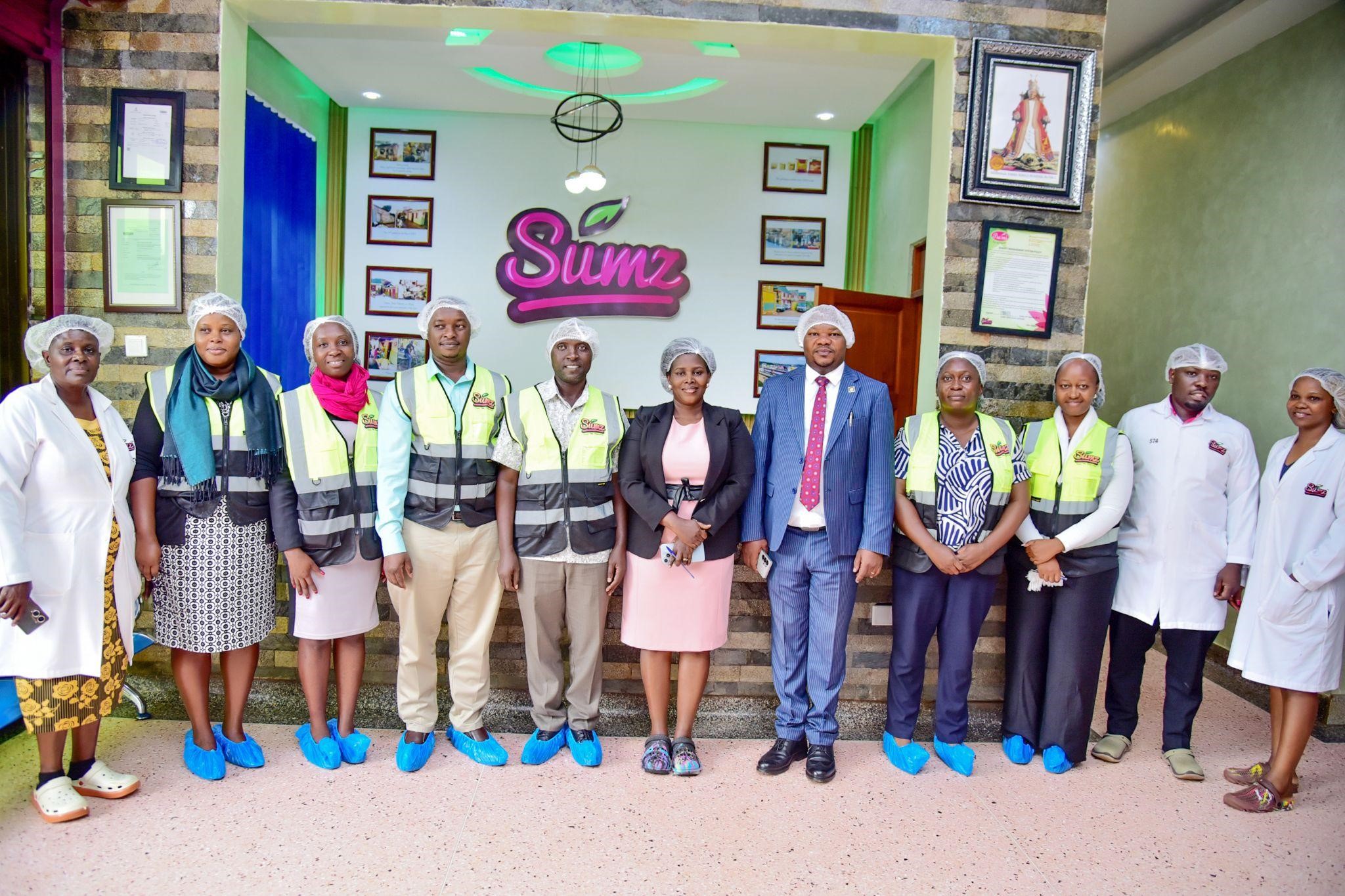
On 2nd March, 2026, representatives from the Advancement Office, the College of Business and Management Sciences and the University Innovation Pod visited Psalms Food Industries to discuss a prospective partnership aimed at strengthening university–industry collaboration in manufacturing, research, innovation, and skills development.
Psalms Food Industries, a homegrown snacks innovation and manufacturing company, operates three major brands, namely, Sumz, Afrikan Harvest and Krunchables, which have grown to a range of 37 products and target the introduction of five new products annually. The company distributes products across Kenya, Rwanda, the Democratic Republic of Congo, South Sudan, and, recently, Tanzania. As a labour of love, the idea of producing snacks was born during the honeymoon of Mr and Mrs Ngabirano, who now run Psalms Food Industries side by side.
Dr. Denis Ngabirano, CEO and Co-Founder of Psalms Food Industries, during the meeting, described the company as “a snacks innovation house, with all our products developed in-house.” He noted.
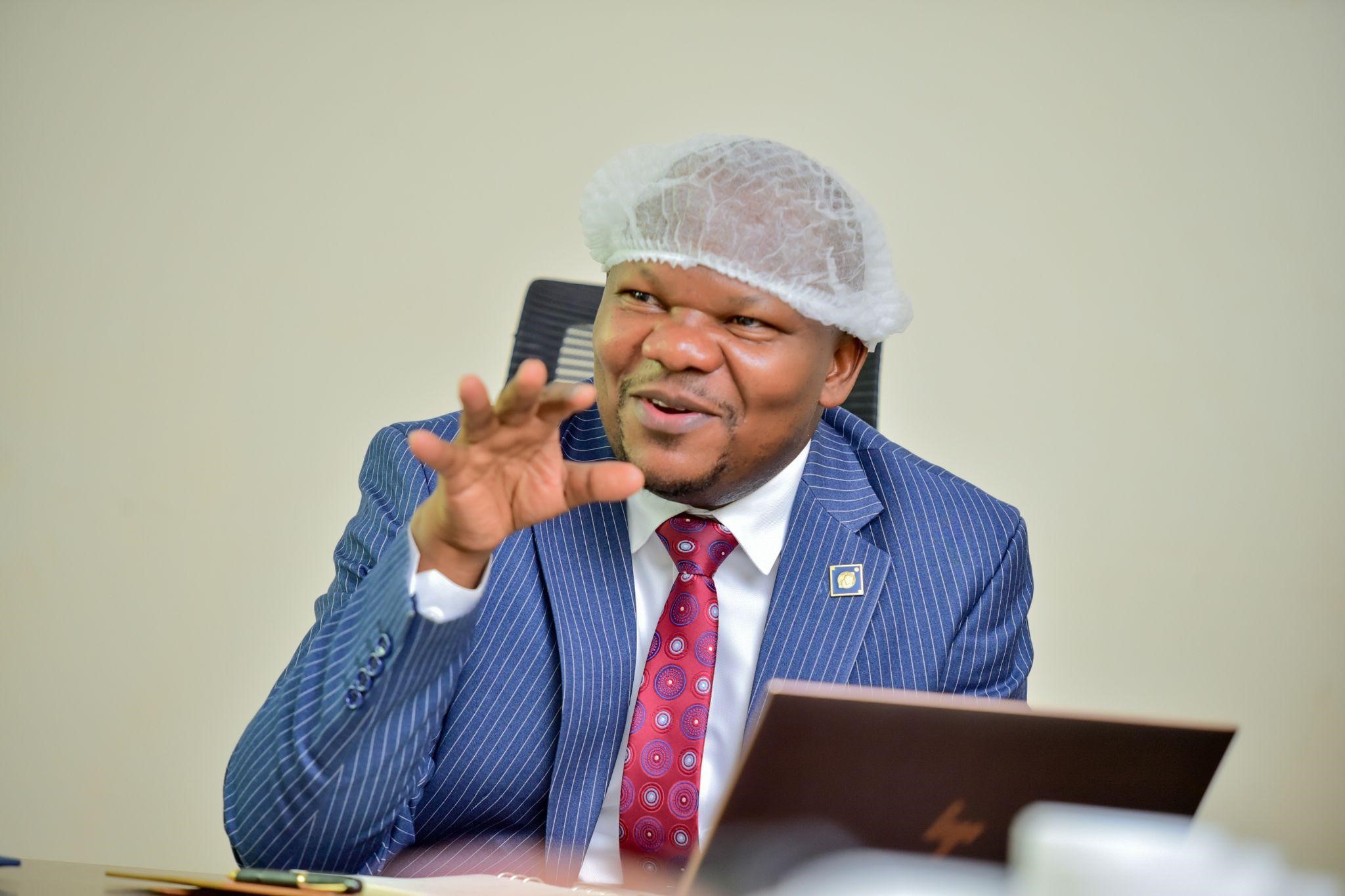
He emphasised the company’s commitment to quality assurance and consumer-centred research, noting that Psalms conducts surveys and gathers customer feedback to inform product development, supported by an internal microbiology and chemistry laboratory.
Dr. Denis Ngabirano noted that the company had only recently introduced two brands, “Afrikan Harvest for it’s health conscious clientele and Kruchables for it’s volume centric clientele.
“Afrikan Harvest has no additives, it is a brand for health-focused consumers,” he explained, while highlighting the differentiated positioning of their product lines. “Sumz is our premium brand, and Krunchables focuses on volume.”
Student-Centered Experiential Learning
A key focus of the meeting was structured experiential learning for students across disciplines. Potential areas of collaboration include internships, graduate trainee pathways, and hands-on exposure within Psalms’ incubation and production facilities.
The proposed engagement spans multiple fields, including environmental sciences, engineering, procurement and logistics, finance and accounting, quality control, production and manufacturing, human resource management, marketing, and international business.
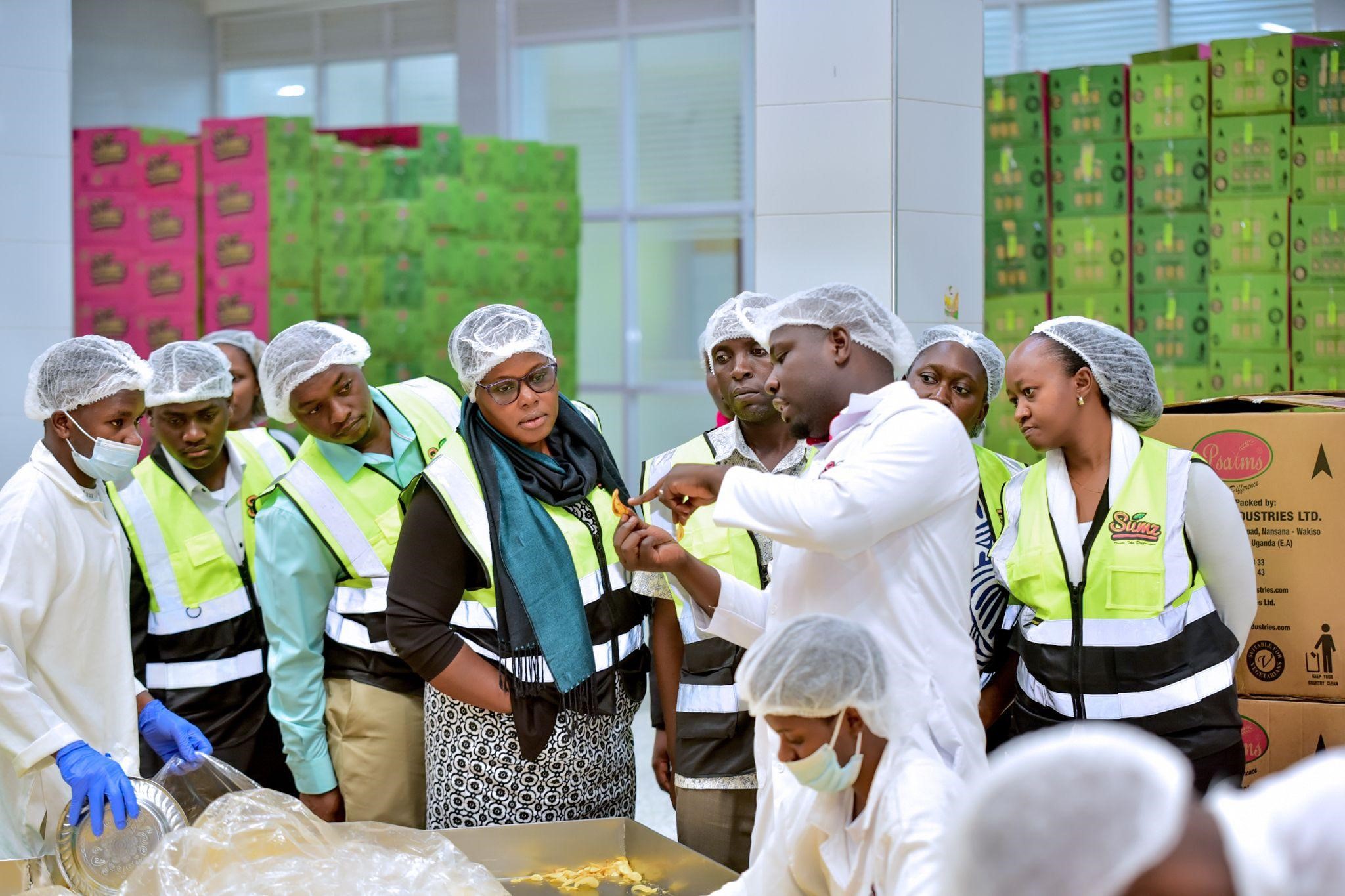
The partnership could provide students with direct exposure to real-time production systems, standard operating procedures (SOPs), and quality assurance frameworks, strengthening the practical relevance of their academic training.
Among the innovative ideas discussed was a potential competition involving students from the Fine Art and Industrial Design disciplines to redesign packaging for selected Sumz products. The proposal would allow top designs to be commercially adopted, creating a direct bridge between creativity, intellectual property development, and industrial application.
Research, Innovation and Commercialisation
Both institutions expressed interest in joint applied research initiatives, particularly in process optimisation, data analytics for manufacturing efficiency, product improvement, and sustainable production systems.
Opportunities were also discussed around collaborative research in machine design, crop development for snack processing, and factory energy solutions, areas that not only benefit Psalms but have broader implications for Uganda’s manufacturing sector.
The engagement further highlighted potential linkages with the University’s innovation and commercialisation structures, including the University Innovation Pod (UNIPOD), to support co-creation and scaling of student-led innovations.
Mr Awel Uwihanganye, Chief Advancement Officer at Makerere University, proposed strengthening the engagement through structured programming, including a planned collaboration between the University’s innovation Hub and the upcoming incubation Hub at Psalms Food Industries, particularly to support the commercialisation of research outcomes for both students and staff.
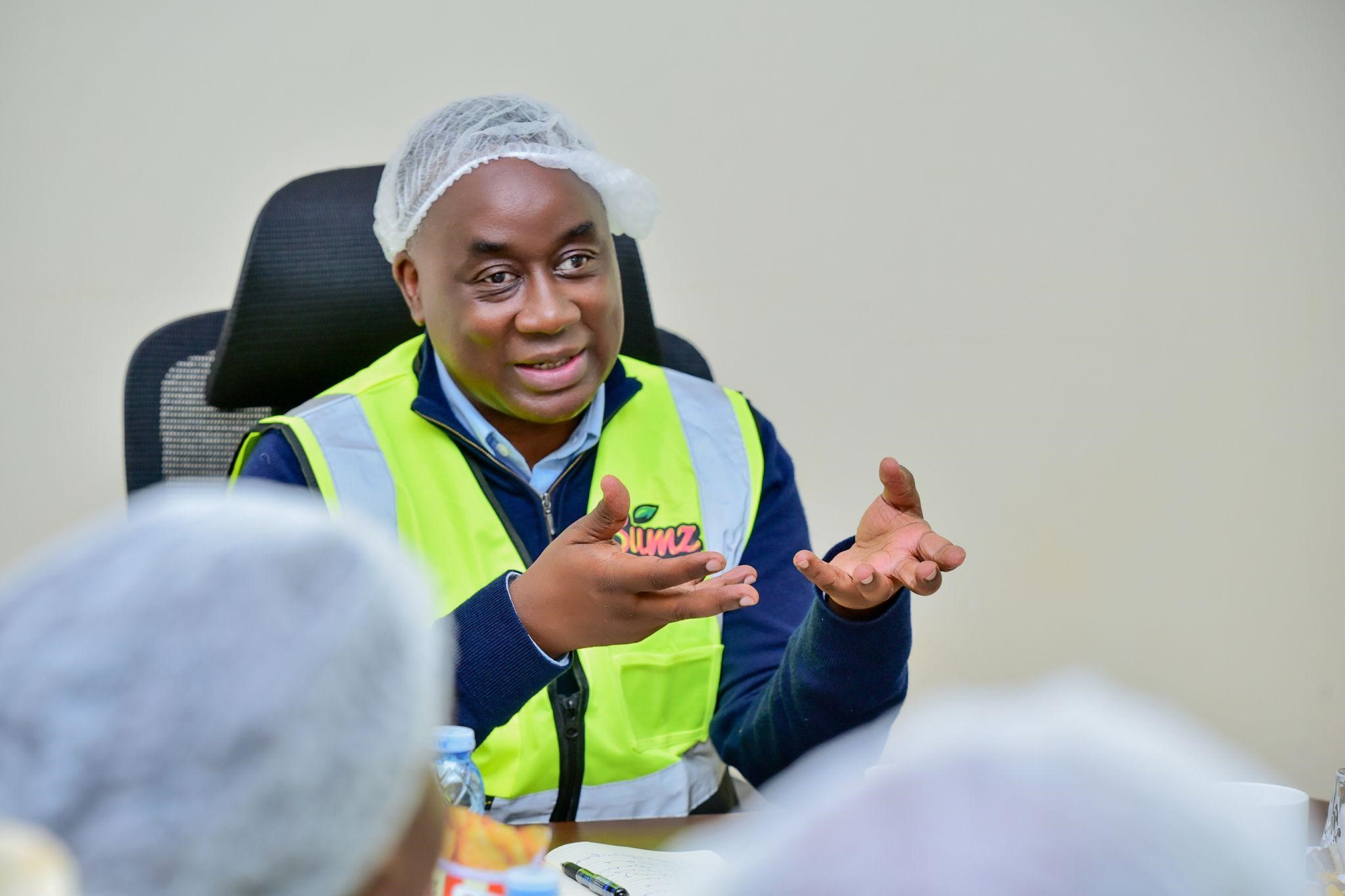
Curriculum Co-Creation and Staff Exchange
Beyond student placements, discussions also focused on co-developing academic content that responds more directly to industry needs, particularly within the manufacturing value chain.
Proposals included guest lectures by industry practitioners, staff exchange programmes to expose academic staff to factory operations, and tailored short courses for Psalms staff based on identified skills gaps.
Dr. Jude Mugarura, Head of the Department of Marketing and Management at COBAMS, emphasised the importance of embedding the partnership within academic programming. He proposed “internships for students in HR, marketing, international business, accounting and finance,” as well as staff exchanges to give University staff hands-on exposure to manufacturing operations.
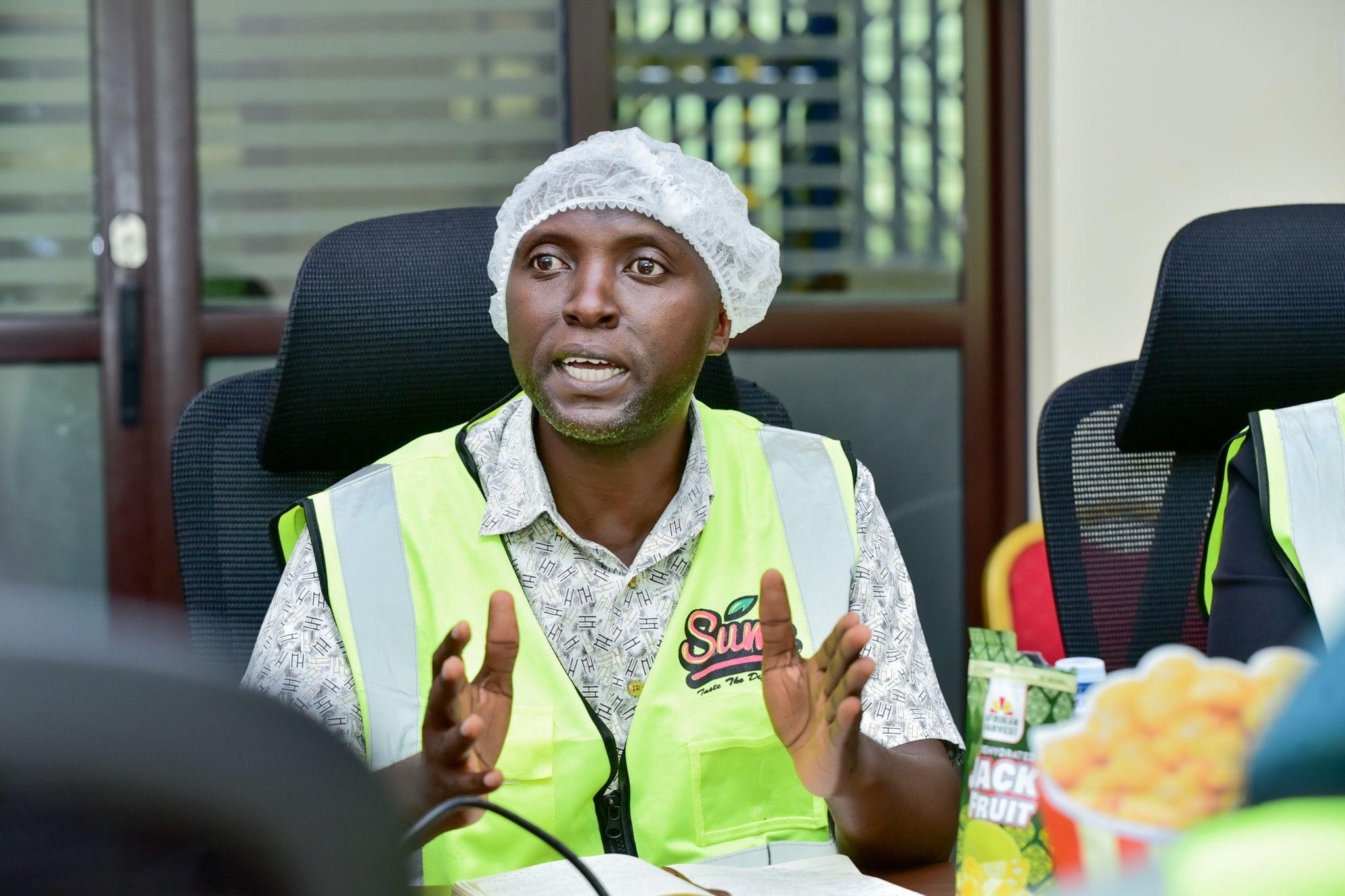
He further suggested specialised courses tailored to the factory’s needs and attachment of research students interested in manufacturing. Such collaboration would contribute to curriculum responsiveness and ensure that graduates are equipped with market-relevant competencies.
Strengthening University–Industry Linkages
The engagement reflects Makerere University’s continued commitment to strengthening partnerships that bridge knowledge generation and real-sector application.
Both institutions expressed a shared vision of building a structured, mutually beneficial collaboration that integrates research, innovation, skills development, and enterprise growth, positioning the University as a key knowledge partner in Uganda’s manufacturing transformation.
Discussions remain ongoing as both parties refine priority areas for formalisation.
Caroline Kainomugisha is the Communications Officer, Advancement Office.
General
Makerere University commemorates 13 transformative years of partnership with Mastercard Foundation
Published
2 days agoon
March 2, 2026
On Friday, 27th February 2026, Makerere University proudly celebrated 13 years of a significant partnership with the Mastercard Foundation, a prestigious independent organisation headquartered in Toronto, Canada. Since its inception in 2013 with the launch of the Scholars Program-currently headed by Prof. Justine Namaalwa, this collaboration has grown significantly, expanding to include two additional initiatives: The E-learning Initiative-headed by Prof. Paul Muyinda Birevu and the Africa Climate Collaborative-headed by Prof. Gorretie Nabanoga. This long-term partnership underscores the shared commitment to fostering education, innovation, and sustainability in Uganda and across Africa.
The colourful event coincided with the 76th Graduation Ceremony, during which Makerere University honoured Ms. Reeta Roy, the Founding President and CEO of the Mastercard Foundation, with an honorary Doctor of Laws.

In her commencement speech, Ms. Roy thanked Makerere University for considering a partnership with the Mastercard Foundation and for conferring upon her a prestigious honorary award.
“Mastercard Foundation is honoured to collaborate with this esteemed university, and I appreciate the recognition through this award. I am excited to be associated with Makerere University and look forward to actively embodying its values. Joining the broader community of alumni from this distinguished institution is a privilege, and I am eager to contribute to its legacy,” stated Ms. Roy.

During the reception in honour of Ms. Roy, the Chairperson of Makerere University Council, Dr. Lorna Magara, acknowledged the invaluable support from the Mastercard Foundation. She emphasised the profound impact of the Foundation’s various initiatives, particularly the scholarships for disadvantaged youth, which enable them to access higher education and opportunities that might have otherwise been beyond their reach.
“On behalf of the Makerere University Council and the broader University community, I extend our sincere gratitude to Mastercard Foundation for its commitment to collaborating with Makerere University in various endeavours, especially for providing scholarships to our underprivileged young people who would never have stepped inside a lecture room at the University.” Dr. Magara stated.

Dr. Magara, in a special way, thanked Ms. Roy for her transformative leadership and unwavering commitment to supporting young people in Africa, citing her efforts to ensure young people get their voices heard.
“As a university, our business is with young people. We are therefore committed to providing the environment and education that deliver meaningful pathways. We will provide an environment that ensures young people have a voice and agency to create meaningful change in society.” Dr. Magara pledged.

Dr. Magara further congratulated Ms. Roy on her honorary Doctor of Laws from Makerere University, noting that it is the university’s highest honour for individuals who have excelled in their careers.
“On behalf of the Makerere University community, I would like to extend my heartfelt congratulations on your honorary Doctor of Laws. This esteemed recognition represents the highest honour our institution can bestow on individuals who have demonstrated exceptional achievement and excellence across various facets of their career.” Dr. Magara remarked.
Prof. Justine Namaalwa, the Program Director of the Mastercard Foundation Scholars Program and the Coordinator for all Mastercard Foundation Initiatives at Makerere University, expressed her appreciation for the thirteen-year collaboration between Makerere University and the Mastercard Foundation. She highlighted that the partnership had yielded significant, impactful results.

“In 2013, Makerere University partnered with the Mastercard Foundation to educate the next generation of transformative African leaders who can positively impact their lives, their communities, and the economies of Africa. The partnership has had a significant impact. I thank the University Management and the Foundation team for this visionary collaboration,” remarked Prof. Namaalwa.
Prof. Namaalwa articulated that the partnership with the Mastercard Foundation is primarily focused on empowering young people as agents of change for transformational leadership in Africa. She presented compelling statistics demonstrating the positive impact of the scholars’ program, highlighting the success of individuals who have completed their education and their subsequent professional experiences after university graduation.

“This partnership focuses on young people, aiming to create positive change in their lives. To date, the Scholars Program has graduated 974 alumni, with 48% securing formal employment, 18% starting their own businesses, 8% participating in internships, and 5% pursuing further education. Overall, 72% of Scholar alumni are actively engaged in employment or entrepreneurship,” Prof. Namaalwa stated.
The colourful event showcased a dynamic array of activities that highlighted the entrepreneurial spirit of Scholars and alumni from the Mastercard Foundation at Makerere University. Attendees enjoyed a mini-exhibition featuring innovative products from these ventures.

A video documentary illustrated the positive impact of the three Mastercard Foundation initiatives. The event also featured inspiring poetry recitations by Scholars and a lively atmosphere of music and dance, creating an engaging and memorable experience for all participants.
The high-level event was attended by senior University officials, led by the Chairperson of Council, Dr. Lorna Magara; the Vice-Chancellor, Prof. Barnabas Nawangwe; the Vice-Chancellor, Academic Affairs, Prof. Sarah Ssali, Deputy, and the Ag. Deputy Vice-Chancellor, Finance and Administration Prof. Winston Tumps Ireeta. Mr Yusuf Kiranda, the University Secretary; and Prof. Buyinza Mukadasi, the Academic Registrar, Chancellor Emeritus-Prof. Ezra Suruma, former Chairperson of the Steering Committee of Mastercard Foundation Scholars Program-Prof. Umar Kakumba, and the Deputy Executive Secretary, RUFORUM, and former Program Coordinator of the Scholars Program at Makerere University-Dr. Florence Nakayiwa, among many other officials graced the function.

The event was also graced by a high-level delegation from the Mastercard Foundation, led by Ms. Reeta Roy, the Founding President of the Foundation, and included the Mastercard Foundation Teams from the Country offices in Kigali, Nairobi, and Kampala; the Program partners; the Mentors, Scholars and alumni; as well as the Program staff of the three Mastercard Foundation Initiatives at Makerere University.
At the end of the event, Makerere University honoured Ms. Reeta Roy with University memorabilia, including a pencil-drawn portrait, a pencil-drawn photo of the Ivory Tower, and other Ugandan crafts. Ms. Roy cut a graduation cake together with the 10 graduates of the 76th graduation ceremony from the Mastercard Foundation Scholars Program.
Bernard Buteera is the Principal Public Relations Officer for the Mastercard Foundation Scholars Program at Makerere University.

It is with great pleasure that I welcome you to this edition of Mak News Magazine, a publication that continues to chronicle Makerere University’s journey as a centre of academic excellence, innovation, and societal transformation.
The stories featured in this issue vividly demonstrate Makerere’s unwavering commitment to addressing national, regional, and global challenges through research, partnerships, and people-centred solutions. They reflect a university that is deeply engaged with society, one that applies knowledge not only to advance scholarship, but also to improve lives.
A recurring theme in this edition is innovation for resilience and inclusion. From the College of Agricultural and Environmental Sciences’ Healthy Soy Initiative combating child malnutrition amid climate change, to the cutting-edge work of CEDAT’s Team Green Minds integrating IoT into agriculture, Makerere continues to harness science and technology to respond to pressing development needs. Equally inspiring is the College of Natural Sciences’ success in securing international funding to scale up fish processing technologies, with a deliberate focus on empowering women and strengthening livelihoods.
This issue also highlights Makerere’s growing role in advancing health and wellbeing. The launch of the Early Intervention Psychiatry Services Clinic at Makerere University Hospital marks an important step in strengthening mental health services, while the Hospital’s transformation from a modest sickbay into a centre of excellence stands as a testament to decades of strategic investment, dedication, and service to the nation.
Our commitment to education access and global engagement is equally evident. Strategic partnerships, such as that between the College of Education and External Studies and the Uganda Vocational and Technical Assessment Board, are expanding pathways to quality education. The establishment of the first-ever United States Studies Centre in the Great Lakes Region positions Makerere as a hub for dialogue, research, and policy engagement on global affairs. We also celebrate our vibrant international community, with graduates drawn from 67 nationalities—affirming Makerere’s status as a truly global university.
This edition further showcases initiatives that ensure long-term institutional sustainability, including the launch of the CoCIS Endowment Fund, infrastructure developments such as the modern hostel at Buyana Farm, and transformative programmes supported by the Mastercard Foundation that continue to empower young people across the continent.
As you read through these pages, I invite you to reflect on the collective effort of our students, staff, alumni, partners, and supporters whose contributions make these achievements possible. Together, we continue to shape Makerere University as a place where knowledge serves humanity.
I wish you an engaging and inspiring read.
Prof. Barnabas Nawangwe
VICE CHANCELLOR
Trending
-

 Humanities & Social Sciences1 week ago
Humanities & Social Sciences1 week agoMeet Najjuka Whitney, The Girl Who Missed Law and Found Her Voice
-

 General1 week ago
General1 week ago76th Graduation Highlights
-

 Health2 weeks ago
Health2 weeks agoUganda has until 2030 to end Open Defecation as Ntaro’s PhD Examines Kabale’s Progress
-

 Agriculture & Environment2 weeks ago
Agriculture & Environment2 weeks agoUganda Martyrs Namugongo Students Turn Organic Waste into Soap in an Innovative School Project on Sustainable Waste Management
-

 Health2 weeks ago
Health2 weeks agoMakerere University School of Public Health Graduates First Cohort of Cost-Effectiveness Analysis Short Course
